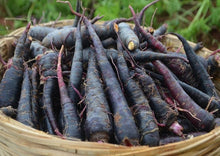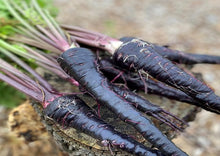Origin: Hidden in the annals of agricultural history, the Black Nebula Carrot emerges as a truly extraordinary heirloom. Its origins are shrouded in mystery, with whispered tales of its existence dating back centuries. Legend has it that these captivating carrots were once cultivated by a secluded tribe in the heart of the Andes Mountains. Passed down through generations, the seeds were safeguarded as a precious family heirloom, their secrets known to only a chosen few.
Today, we unveil the Black Nebula Carrot, a rare and mesmerizing heirloom variety that has finally emerged from obscurity. Its lineage is a testament to the art of preservation, as these seeds have been handed down through time, a gift from the past to the present.
Features:
-
Celestial Beauty: The Black Nebula Carrot is a visual marvel. Its dark, near-black skin conceals a brilliant and vibrant orange core, creating a striking contrast that is nothing short of celestial. Each carrot is a masterpiece of nature's artistry.
-
Flavorful Alchemy: Beyond its captivating appearance, the Black Nebula Carrot enchants the palate with a flavor profile that is both sweet and complex. Its earthy undertones and hints of spice make it a culinary gem that elevates any dish.
-
Nutrient-Rich Heritage: This heirloom treasure isn't just a feast for the senses; it's a powerhouse of nutrition. Packed with essential vitamins, minerals, and antioxidants, the Black Nebula Carrot is a symbol of nature's ability to provide both beauty and sustenance.
-
Cultivating Legacy: By planting Black Nebula Carrot seeds, you become a steward of history. You breathe life into an ancient legacy, connecting with generations of caretakers who recognized the value of preserving the extraordinary.
-
Gourmet Inspiration: Elevate your culinary creations with the Black Nebula Carrot. Its unique appearance and rich flavor make it a standout ingredient in everything from gourmet salads to innovative cocktails.
Heirloom Organically grown Black Nebula Carrot Seeds are a unique and rare variety of carrot that boast a deep purple color and a sweet, rich flavor. These seeds are highly sought after by gardeners and farmers alike due to their heirloom status, meaning they are open-pollinated and non-GMO. Additionally, these seeds are certified organic, which means they are grown without the use of synthetic pesticides or fertilizers, ensuring a high-quality, safe and healthy crop. The Black Nebula Carrot is believed to have originated in the Middle East or Asia and is known for its high yield. These seeds are perfect for those looking to add a touch of color and flavor to their garden or farm.
Growing
Carrots grown in garden are full of flavor and texture. They are easy to grow as long as they are planted in loose, sandy soil during the cooler periods of the growing season—spring and fall (carrots can tolerate frost). Depending on the variety and local growing conditions, carrots may take anywhere from 2 to 4 months to mature. Plant them in the spring and summer for a continuous harvest through fall!
Planting
- Proper soil preparation is extremely important for carrot growing. If the carrot roots can’t easily grow unobstructed, it can lead to stunted and misshapen crops. Till down 12 inches and make sure there are no rocks, stones, or even soil clumps that could impede your carrots’ growth.
- Sow seeds outdoors 3 to 5 weeks before the last spring frost date. For continuous harvest, sow seeds every 2 weeks through late spring. For a fall harvest, sow seeds in mid- to late summer—starting about 10 weeks before your first fall frost.
- Sow seeds directly in the garden rather than transplanting. Carrots do not like to have their roots disturbed.
- Keep the soil moist with frequent shallow watering. For small carrot seeds to germinate, the soil shouldn’t form a hard crust on top; cover with a layer of vermiculite or fine compost to prevent a crust from forming.
- Avoid amending the soil with nitrogen-rich fertilizer, which causes carrots to fork and grow little roots.
- If the ground has clay, consider planting in a raised bed at least 12 inches deep and filled with airy, loamy soil.
- Choose a location that receives full sunlight. Carrot plants can tolerate partial shade too.
- Soil must be loose, sandy or loamy, and airy so that carrot roots can easily push down through the soil.
Care
- When seedlings are an inch tall, thin so that they stand 3 to 4 inches apart. Snip tops with scissors instead of pulling them out to prevent damage to the fragile roots of the remaining plants.
- Gently mulch carrots to retain moisture, speed germination, and block the sun from hitting the roots directly.
- Water at least one inch (about ½ gallon per square foot) per week to start, then two inches as roots mature.
- Weed diligently, but be careful not to disturb the young carrots’ roots while doing so.
Pests / Diseases
- Pests: Black canker, Carrot rust flies, Flea Beetles, Root-knot nematodes, Wireworms
- Aster Yellow Disease will cause shortened and discolored carrot tops and hairy roots. This disease is spread by pests as they feed from plant to plant. Keep weeds down and invest in a control plan for pests such as leafhoppers. This disease has the ability to overwinter.

Indian vegetable seeds; Best indian vegetable seeds in USA; Top vegetable seeds for USA climate; Organic vegetable seeds India; High yield vegetable seeds India; Popular vegetable seeds in India, Heirloom Indian vegetable seeds USA; Vegetable seeds for home gardening USA; Traditional Indian vegetable seeds; Non-GMO vegetable seeds USA; Vegetable seeds for balcony gardening India; High-quality indian vegetable seeds USA; Vegetable seeds for urban farming USA; Seed companies in India; Best vegetable seeds for Indian kitchen garden; Fast-growing vegetable seeds India; Vegetable seeds for all seasons India; Best vegetable seeds for hydroponic gardening India; Vegetable seeds for beginner gardeners India and USA; Rare vegetable seeds India; Affordable vegetable seeds India; Imported vegetable seeds India; Native Indian vegetable seeds; Open-pollinated vegetable seeds India.




